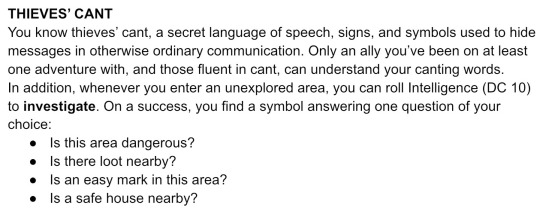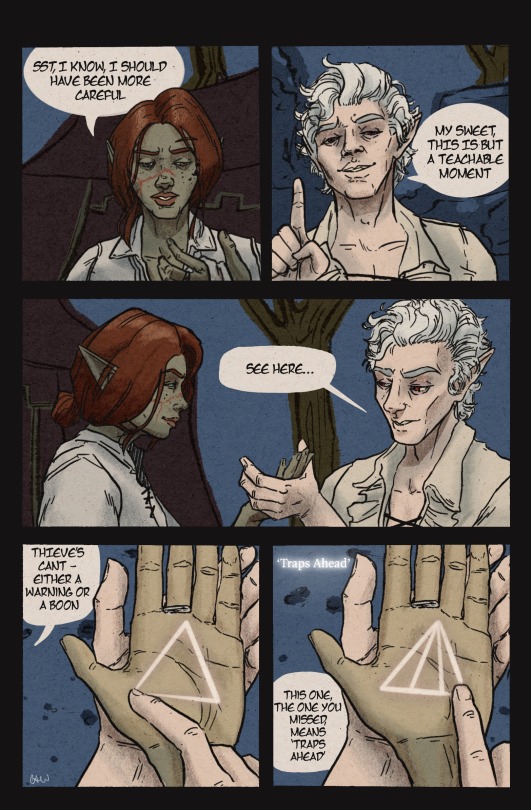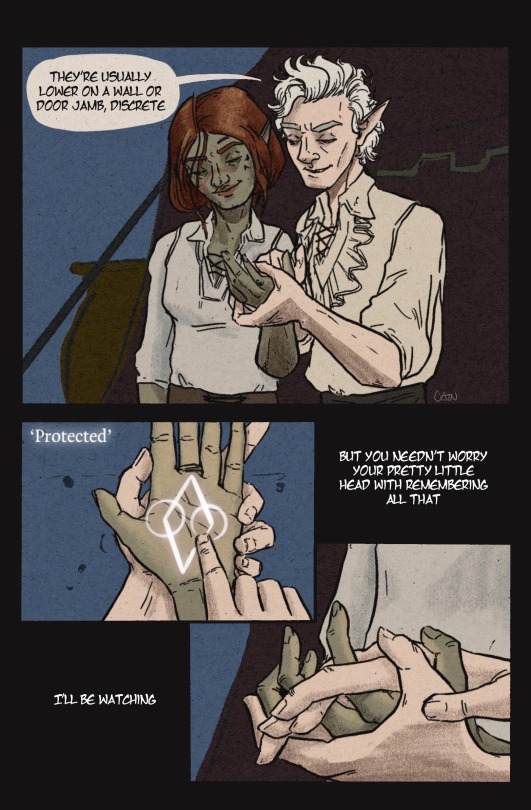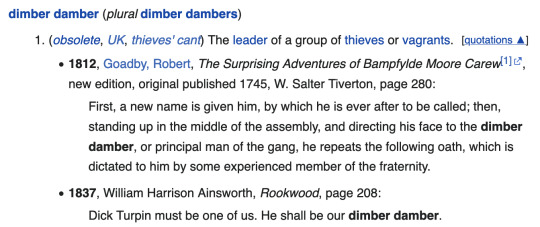#thieves cant
Text
I love thieves’ cant, but it has literally never come up in a single D&D game I’ve ever played.
I’m designing a D&D style TTRPG, so while writing the rogue class I wanted thieves’ cant to be actually useful during exploration and social interaction. Here’s what I’ve got:

This more closely aligns with how I imagine thieves’ cant should work in fiction, and looks genuinely fun to use at the table!
554 notes
·
View notes
Text


My twitching fingers do their best
To keep their wandering selves in check (x)
A tiny comic of @ladymdc's darling tav, Asher, receiving an education about thieves cant from her favorite charlatan
49 notes
·
View notes
Text
Today we're learning about criminals, prostitutes, secret languages and medieval heretical sects!
I want to rant about Swedish etymology, specifically regarding the word bög. It is pronounced a bit like "beg," but with the lips pursed to an O and with a long vowel (IPA: \bøːg\).
The word means "gay man" and occupies a somewhat complicated place somewhere between a slur and the established word for homosexuality. I don't really like the phonoaesthetics of the word, but then again, perhaps I just had it hurled at me one too many times in elementary school.
Anyway, etymology.
There are two main competing etymologies for this word. I'll start with the one that I think is less likely: that the word is related to English bugger and French bougre. These words have been used in various parts of Europe to mean "sodomite" for centuries, deriving from accusations leveled at the Bogomil and Cathar heresies by the Catholic Church during the medieval period. These groups were gnostics, and (according to the Church) hated the sinful physical world to the point of being antinatalists: people who believe having children is morally wrong. So far this might in theory be true, but they were also quite dubiously accused of encouraging sodomy among followers to this end. The word bugger itself is presumed to either come from Bogomil or Bulgarian, since the Balkans were the origin point of these heresies.
We know for a fact that the word was borrowed into Swedish as buger (bugern, bugrar, bugrarna) around 1900, a word used by, among others, Swedish literary titan August Strindberg. That's also where the etymology for bög becomes a bit troublesome, because bög does not appear to have been a warping of the pronunciation of this word: it is already known to have existed in the Swedish lexicon at this time.
The alternate explanation goes back to the knallar, peddlers in particularly mid-southern Sweden (Västergötland/Westrogothia) who walked door to door selling whatever they could carry with them in the countryside. These people saw their peak around the 18th and 19th centuries, before declining into obscurity at the start of the 20th. These wandering salesmen are a fascinating topic in their own right, but what's particularly important for us is their secret language, Månsing (sometimes Monsing). The Swedish language has a rich and fascinating vocabulary of words I like to call "permanent slang." These words come from thieves' cants, the secret languages of professionals (such as Månsing and Knoparmoj, the chimneysweep language), and several minority languages like Yiddish and Romani Chib. Well-known Swedish words like tjej (girl), jycke (dog) and sno (steal) are all regarded as slang in the public eye, even though the words have been in use for well over a century, if not several centuries. Since slang is usually either quickly invented and forgotten or incorporated into standard language, this is very interesting in my opinion.
One such source for "permanent slang" is Månsing. The language is extinct now, and only caught the attention of linguists when it was already in decline, but we still have a few hundred vocabulary words documented, and one of the oldest and most widespread is bögis. This word bears a striking resemblance bög, and the -is ending is a very common Swedish diminuitive, probably first introduced in Månsing where it was probably borrowed from latin, such as in the Månsing word for dog, kanis (from canis). This ending was then (perhaps humorously) added to other words, like jamis, cat (from the Swedish verb jama, to meow).
The problem is the meaning of the word. Bögis does not mean gay, sodomite, or anything of the sort, it means peasant or farmer. The related word bögishäck means farm, and so on.
The reason why this is still a plausible origin of bög has to do with the relationship these peddlers had with farm owners. The knallar were seen as anything from semi-honest traders to downright scam artists and smugglers, so what would farmers have been from their perspective? Either prospective customers or potential victims to mislead and make money off of. This use of the word bögis came to enter city slang, where it took on a new meaning among people who had different life experiences.
In the late 19th century, slang and cant dictionaries start reporting the word bögis or bög as being part of the lexicon of the lower layers of the growing city of Stockholm. The "lumpen," the thieves and prostitutes, used the word to either mean "someone who is easily fooled" or as a synonym for "mark" or "target," that is, someone you intend to either sell something to, or rob. The connection to the way the knallar used it is fairly obvious.
Over time, the word came to usually refer specifically to the customer of a prostitute, and eventually specifically one of a male prostitute, and then also the male prostitute himself, though the path there was long. In the early 20th century, bög was still competing with the previously mentioned buger, as well as with sodomit, kvinnohatare (woman-hater), homofil, homos, and several words relating to pederasty.
By the 1910s it appears that bög was winning out, and as the gay movement came to Sweden in the 70s, the word began to be reclaimed by activists, though the exact level of offense the word carries is still a bit complicated, as mentioned.
This etymology makes bög a sister word to the English word gay, which was also originally slang used in growing cities by thieves and prostitutes. It also connects it to schwul, a German word with a similar story.
This also gives us an interesting social history of the LGBT+ movement: perhaps the reason why queer rights became an issue in the 20th century is because there was no such thing as a queer subculture until the 19th century, and the reason why it emerged then is very specifically because that's the when big U Urbanizarion took place, and thus when urban crime and underground communities emerged, which have a very distinct character from their rural counterparts. In other words, maybe big cities led to the emegence of an underclass of thieves and prostitutes, and maybe we have thieves and prostitues to thank for queer rights today! That's just a speculation, though.
My main source today was the work of Fredik Silverstolpe, who has researched swedish queer history for decades. I can give you some links if you DM me, but they are all in Swedish.
#queer history#swedish#sweden#etymology#linguistics#thieves cant#secret languages#svenska#social history#history#language#mini essay#essay
64 notes
·
View notes
Text

248 Thieves' Cant
27 notes
·
View notes
Text
You know what?
None of you are safe.
This is a personal declaration to steal something from each of my follower’s blogs! (…at least the ones I can see.)
Prepare thyself…
8 notes
·
View notes
Text


Word for today: dimber damber
The leader of a gang of criminals. (Note that the thesaurus gives a number of synonyms, but fails to note that Dell and Doxy are both specifically female.)
26 notes
·
View notes
Text
Thieves' Cant Prompt
You're a member of a secret organization that specializes in delivering messages discreetly. So discreetly that they're delivered in plain sight and only it's intended receiver gets the message.
One day, you get a message from the organization that you are under pursuit...by the same organization.
#rogue#thieves cant#writing prompt#creative writing ideas#original prompt#secret message#creative writing#storytelling#writters on tumblr#writerscommunity#fanfiction writer
2 notes
·
View notes
Photo

Challenge #03484-I196: A Basket Full of Trouble
A young Tiefling brings a bouquet of flowers to Vee and Amatu while Wraithvine deals with the local authorities after picking up the young magic user they met.
https://peakd.com/fiction/@internutter/challenge-03371-i083-deja-vu-all-over-again -- Anon Guest
[AN: The WHOLE adventuring party so far is: Wraithvine, Amatu, Pondermore, Vee, and Rawr. Our little thief makes six. That's a pretty full adventuring party. Therefore, Tiefling has to be a recurring NPC. It's usually a FIVE man band for a reason]
"Posies, Daisies, lu-u-ucky Heather," sang another street denizen with a tray display. "Boutonnieres, bouquets, in a-a-any weather."
Wraithvine, spinning several plates at once, paid the young Tiefling no mind. Ze was already busy trying to explain that they wanted the snake in the cage, not the Ogre, the Bugbear, or the well-dressed young gentleman with horns. This involved showing each and every one of them the warrant in question.
Vee was doing her best to pretend everything was normal whilst Rawr was giving the street vendor some funny looks. "Something wrong, Uncle?"
[Check the source for the rest of the story]
4 notes
·
View notes
Text
As you and your party approach the man you’ve been searching for an air of dread hangs over you all. The man appears shifty; he’s smirking in a way that makes you all incredibly nervous. Finding him wasn’t easy and you knew getting him to talk would be even less so. When you do reach him and begin asking about your quest he snorts out a laugh and begins speaking in an incomprehensible series of sounds. The rest of your party displays mixed reactions; some visibly deflate, others seem to internally scream. You’d all worked tirelessly to find this man, running all around doing favors for nearly the whole town! One by one your party begins to turn around seeming to have silently reached the same consensus to abandon this vexatious quest. However you stand ram rod straight, glued to the spot. A slow but wide grin begins to form on your face and you bark out a laugh. The man becomes silent because, you just remembered that you speak thieves cant and understood every strange word that fell out of his mouth! You kick off in a chain of what sounds to be gibberish to rest of your team; however, the man finally conceded and gives you the information you’ve been incessantly searching for! You turn around to give your comrades the information when you notice the varied looks of awe and confusion on their faces. Because to them, that whole encounter looked like…

#cause ya know#thieves scat#I’m sorry#i thought i was funny#thieves cant#dnd#please don’t throw rocks at me#Spotify#SoundCloud
2 notes
·
View notes
Text
Caleb Landry Jones in Antiviral feels like he's someone's poor meow meow boy
#thieves cant#antiviral#caleb landry jones#its back on Netflix#so now i need to subject everyone to it#.txt
6 notes
·
View notes
Text
Weird languages your rogues could know
Besides the usual thieves' cant.
Hole Pidgin
Dwarf strongholds and gnome warrens can both expand outward very rapidly. When one inevitably bursts through the walls of another by mistake, they will make haste in beginning commerce between the two settlements. Hole Pidgin is how they communicate with each other; a mishmash of Dwarven and Gnomish vocabulary with very inconsistent grammar and no set word order. It can be difficult to understand even to people who can speak both languages fluently - being immersed in one of these "collision points" for an extended period of time is the only sure way to properly learn it.
Low Magic
This is a cryptolect that can originate from some sort of society ruled by wizards, where those without magic have the least power. Low Magic is a way for those at the bottom of this society to communicate in safety from their cruel wizard overlords. Formed by replacing words from the lexicon of the dominant language with unrelated magic words, anyone with the ability to cast spells even attempting to comprehend it will produce unpredictable and possibly dangerous magic effects. (Use your favorite wild magic table, or roll up a random spell and cast it on a random target.) To those without magic, it's perfectly safe to speak.
The Secret Shanties
These shanties have sections between the chorus and verses for a solo singer to improvise within a strict set of rules. The particular notes and cadences they choose can convey a great deal of information to the members of the crew who are in on the ship's less "above the board" business, while leaving those who don't know what to listen for able to just go about their normal jobs and claim ignorance. There are three popular songs, each with their own rules and code, but any good smuggler or pirate captain will have also cooked up their own bespoke one. Learning to interpret Secret Shanties is about the same difficulty as any other code or secret language; learning to speak it yourself also requires a great deal of musical improvisational skill on top of that.
1 note
·
View note
Text
what would u guys say if i told you one of my favourite ocs is a thief who causes problems on purpose, has a long scar down his face, a fully black eye, and also likes older men.
0 notes
Text
Pig Latin in the streets, Polari in the sheets
0 notes
Text




when im in a worst roommate ever competition & my opponent is joker persona 5 royal 🙄
#cant get anything done w/ him around#akechi: most beleaguered college student#LITERALLY ME RN !!!#sorry ....#guess who was passing away for the past two months#this semester hit me like a TRUCK#no time orz for anything .....#persona 5#p5#persona 5 royal#p5r#procreate#2024#goro akechi#persona 5 protagonist#ren amamiya#akira kurusu#phantom thieves#shuake#akeshu#6.5 hours#i havent drawn them in so longgg#ill try to drag up some sketches to avoid disappearing for weeks on end
2K notes
·
View notes
Note
Orb?
I heard you have orb. As a self-proclaimed Oblin I will now try and steal the orb. Be warned.
Heh. Try all you like, but it’s MINE.
8 notes
·
View notes
Text

Maaaaan, that was close...
#persona 5#p5#p5 fanart#phantom thieves#my art#holding atlus by the neck LISTEN. you cant make your character's whole deal the fact that he's a survivor of abuse and then use him as a#as a literal punching bag as a joke. you cant. the joke doesnt fucking land and i WILL kill you.#anyway everyone should've rushed to hug ryuji in absolute relief when they saw him and then thank him for what he did#and congratulate him on his great running cause he's been working so SO hard to get back to that point and he deserves the praise
2K notes
·
View notes